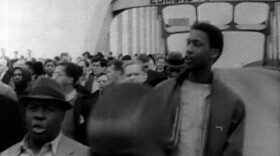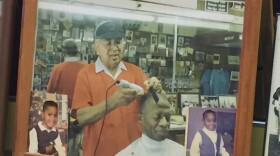If you'd like to hear more of Alabama Public Radio's award winning work on the civil rights movement, click below. APR's civil rights coverage is international in scope. In January of 2016, we participated in an international journalism exchange program. That's where we first met Ousmane Sagara of the West African nation of Mali. He explained to me how there are roads and parks named for Martin Luther King, junior. That prompted me, a year later, to invite him to take part in APR series and documentary on King's connection to Alabama. That material aired around the 50th anniversary of Dr. King's assassination. Pat Duggins, News Director, Alabama Public Radio.
50 years ago, a bomb exploded at the 16th street Baptist Church in Birmingham. Four young girls were killed in the blast. It would take 14 years before the first Klansman was tried and convicted in the bombing. Robert Chambliss was found guilty of his part in the attack.
He wound up at the St. Clair County Correctional Facility, about 40 miles northeast of Birmingham. It’s here where Chambliss wrote letters to his family during his time in prison.
The handwritten letters, and the pictures they paint from that time, can now be found with just a short ride down a creaky elevator to the bowels of the Archives Department at the Birmingham Public Library.
April 20, 1979
Yes Mommie you told me and told me you called the Governor. Mommie I ask you again did you talk to the governor. Did you call my lawyer. What did he say. Wrote the governor a nice 2 1/2 page letter. The reason he sent the Lt. Governor’s staff over her to talk to me tell our little Babby to write one. Put in your letter so it won’t cost her postage.
Answer soon, Your loving husband, R.E. Chambliss
“Mommie” is Chambliss’ wife.
Archivist Jim Baggett has been studying those decade-old letters in detail.
“Chambliss is almost entirely focused on himself in these letters,” says Baggett. “There’s a lot of self-pity and he presents himself as a victim and he never acknowledges any involvement in the bombings. There’s no remorse. There’s no acceptance of responsibility at all.”
In 1963, Chambliss was better known by his nickname, Dynamite Bob. Prosecutors at the time called him a skilled bomb maker, responsible for several racially motivated attacks in Birmingham, though the number isn’t clear. Baggett says one element was race—not that of his victims. But, rather his own.
“His self-worth comes from the fact that there’s this whole other group of people he can look down upon and dominate,” explains Baggett. “So, I think this accounts for a lot of the reason that people like Chambliss reacted so violently to civil rights activity. It wasn’t just an attack on the social system that they lived in that was segregated. It was an attack on their whole self-image, their own self-worth and how they saw themselves.”
Other observers of the 16th Street Baptist Church Bombing have a more straightforward assessment of Chambliss.
“The thing that I recall most about him is just a deep sense of meanness. Someone who had such a deep hatred.”
Doctor Art Dunning is a professor at the University of Alabama. He was one of just a few African Americans to attend the Tuscaloosa campus in 1966, three years after the Stand in the Schoolhouse Door. He agrees white supremacists were threatened by this change in social order, and that’s what spurred the violence.
“I do think that Chambliss’s other world saw this sort of social order crumbling where just by hereditary advantage that certain things, I don’t have to do anything just be born in a certain group, I have this distinct advantage. I think that was disturbing to them,” says Dunning.
Back at the Birmingham Public Library, Jim Baggett uses a cart to retrieve Chambliss’ letters from a sea of filing boxes. He pulls another one. It’s also addressed to his wife, dated April 25, 1979.
“I don’t trust my lawyer. They are giving big meetings all around taking up big collections. What are they doing with the money. He said it’s being put in the bank first national bank in north Birmingham in your name. I can’t sleep but about thirty minutes at the time. I hardly ever lay down till 11 or 12 o’clock. Mommie i got plenty to tell you when and if i ever get out. It would make you all want to kill somebody.”
Chambliss wrote dozens of letters over the next six years. He never did successfully get out of prison as he had tried to for as long as he was incarcerated. Chambliss died behind bars in October 1985.
There’s still a connection between the prison and the 16th Street Baptist Church Bombing. One of Chambliss’ accomplices, Thomas Blanton, is still serving a life sentence there.



























